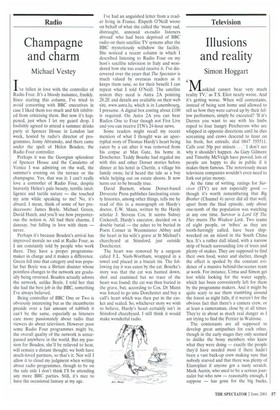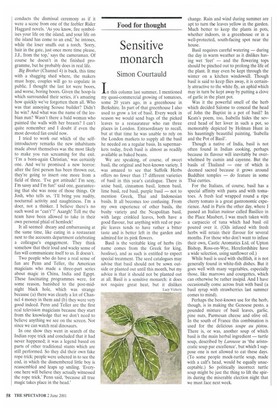Television
Illusions and reality
Simon Hogaart
ankind cannot bear very much reality TV,' as T.S. Eliot nearly wrote. And it's getting worse. When will contestants, instead of being sent home and allowed to tell us how they were carved up by their fellow performers, simply be executed? 'If it's Darren you want to see with his limbs roped to four hungry Percherons who are whipped in opposite directions until he dies screaming and crows descend to feast on his fresh, hot entrails, dial 0847 555511. Calls cost 50p per minute ... ' I don't see why it shouldn't happen. As Gary Gilmore and Timothy McVeigh have proved, lots of people are happy to die in public if it makes them famous. The notoriously mean television companies wouldn't even need to fork out prize money.
At the time of writing, ratings for Survivor (ITV) are not especially good — though it's worth remembering that Big Brother (Channel 4) never did all that well; apart from the final episode, only about one-tenth of the population was watching at any one time. Survivor is Lord Of The Flies meets The Weakest Link. Two teams of eight people, or 'tribes' as they are tooth-furringly called, have been shipwrecked on an island in the South China Sea. It's a rather dull island, with a narrow strip of beach surrounding lots of trees and plenty of snakes. They are supposed to find their own food, water and shelter, though the effect is spoiled by the constant evidence of a massive behind-the-scenes team at work. For instance, Urma and Simon get lost while looking for the water supply, which has been conveniently left for them by the programme makers. And it might be quite scary to see them stumbling around the forest as night falls, if it weren't for the obvious fact that there's a camera crew, or at least a cameraman, close by at all times. They're in about as much real danger as I am trying to find the Perrier in Waitrose.
The contestants are all supposed to develop great antipathies for each other, though in the early stages they only seemed to dislike the bossy members who knew what they were doing — exactly the people they'd have needed most if there hadn't been a vast back-up crew making sure that nobody starved and that there was plenty of Elastoplast if anyone got a nasty scratch. Mark Austin, who used to be a serious journalist but who now — reasonably enough, I suppose — has gone for the big bucks, conducts the dismissal ceremony as if it were a scene from one of the feebler Rider Haggard novels, 'As you know, fire symbolises your life on the island, and your life on the island has come to an end,' he intones, while the loser snuffs out a torch. 'Sony, hair in the gate, just once more time please, J.J., from the top,' says the cameraman. Of course he doesn't in the finished programme, but he probably does in real life.
Big Brother (Channel 4) is back, this time with a shagging shed where, the makers must hope, couples will go to copulate in public. I thought the last lot were boors, and worse, boring boors. Given the hoop-la which surrounded their series, it's amazing how quickly we've forgotten them all. Who was that annoying Scouse builder? Didn't he win? And what was the name of the lesbian nun? Wasn't there a bald woman who painted the walls with her breasts? I can't quite remember and I doubt if even the most devoted fan could now.
I tried to work out which of the selfintroductory remarks the new inhabitants made about themselves was the most likely to make you run screaming for the exit. 'I'm a born-again Christian,' was certainly one. And we're promised a new horror: after the first person has been thrown out, they're going to insert one more from a field of three. 'I've got attitude! I'm sexy, I'm sassy and I'm fun!' said one, guaranteeing that she was none of those things. Or Josh, who tells us, bring you nudity, nocturnal activity and naughtiness. I'm a doer, not a thinker. I believe there's no such word as "can't"!' Aaargh! Tell me the team have been allowed to take in their own personal phial of hemlock!
It all seemed dreary and embarrassing at the same time, like eating in a restaurant next to the accounts department celebrating a colleague's engagement. They think somehow that their loud and wacky sense of fun will communicate itself to us. It doesn't.
Two people who do have a real sense of fun are Penn and Teller, the American magicians who made a three-part series about magic in China, India and Egypt. These fascinating programmes were, for some reason, banished to the post-midnight black hole, which was strange because (a) there was clearly a lot of Channel 4 money in them and (b) they were very good indeed. Penn and Teller are the first real television magicians because they start from the knowledge that we don't need to believe anything we see on the screen. Not since we can watch real dinosaurs.
In one show they went in search of the Indian rope trick and concluded that it had never happened; it was a legend based on parts of other traditional stunts which are still performed. So they did their own fake rope trick; people were ushered in to see the end, in which the dismembered little boy is reassembled and leaps up smiling. 'Everyone here will believe they actually witnessed the rope trick,' Penn said, 'because all true magic takes place in the head.'











































































 Previous page
Previous page